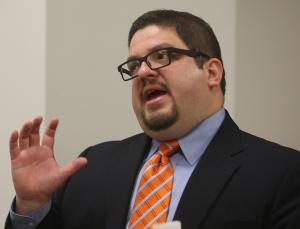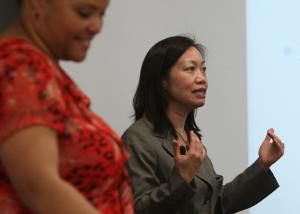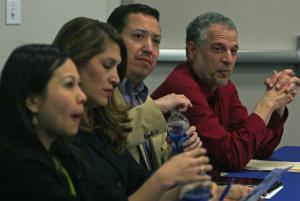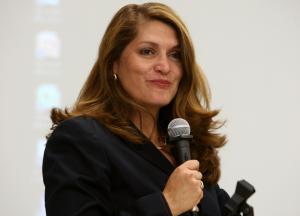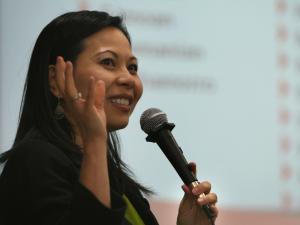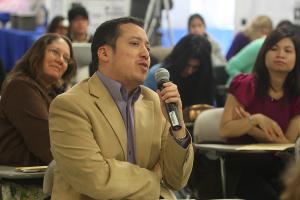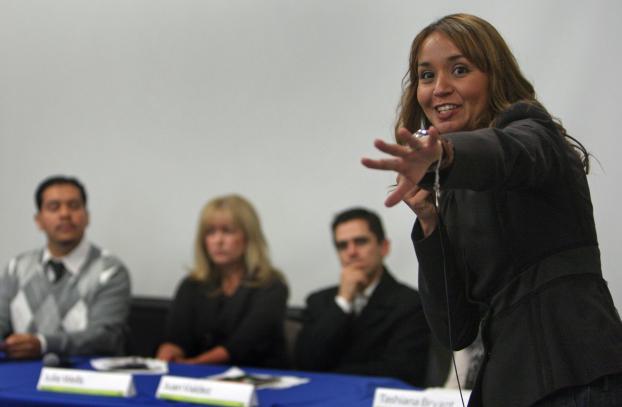 Caption: Minerva S. Chavez, assistant professor of secondary education, right, moderates a Graduate Forum panel of graduate students, who spoke about their experiences. Photo by Karen Tapia
Caption: Minerva S. Chavez, assistant professor of secondary education, right, moderates a Graduate Forum panel of graduate students, who spoke about their experiences. Photo by Karen Tapia
Promoting Diversity
Second Graduate Forum Addresses Benefits of Diverse Education
ACCORDING TO THE LATEST U.S. CENSUS statistics, there were 47.8 million Latinos (15.5 percent of the total population) in the country in 2010, and that number is projected to grow to 102.6 million (24.4 percent of the population) by 2050.
Between 2000 and 2006, Latinos — the nation's largest minority group — accounted for half of the nation's growth, yet the number of Latinos and other minorities in college is not keeping pace. However, higher education is important to Latinos, reported Mark Hugo Lopez, associate director of the Pew Hispanic Center, who delivered the keynote address at Cal State Fullerton’s Second Annual Graduate Forum on March 22.
“We asked young Latinos, ‘why aren't you enrolled in school?’ ” Lopez said. “And, the No. 1 reason they gave to us was their need to support family.”
Latinos aged 30-34 lag well behind the general U.S. population at all levels — high school, college and post graduate study, Lopez said.
Addressing the Disparity
The disparity between the growing population numbers and the number of Hispanic college graduates needs to be addressed, said Silas H. Abrego, acting vice president for student affairs at Cal State Fullerton. “Whereas 31.2 percent of the undergraduate student body is Hispanic at Cal State Fullerton, only 15.5 percent of postbaccalaureate students are Hispanic.”
The advancement of Latino and other minority postbaccalaureate students “is not only critical to the local context but directly tied to the nation’s educational prosperity,” he said.
How to close the achievement gap by promoting diversity on campus and beyond was the theme of this year's Graduate Forum, said Dorota Huizinga, associate vice president for graduate programs and research.
Huizinga and Katherine Powers, director of graduate studies, are helping address the disparity through a $2.8 million U.S. Department of Education grant aimed at doing just that.
“Diversity in graduate education today will bring economic stability tomorrow,” Powers said, adding that the Promoting Postbaccalaureate Opportunities for Hispanic Americans (EPOCHS) grant will build the infrastructure and create a campus culture promoting postbaccalaureate education.
“Statistics and demographic predictions demonstrate that, in order for the U.S., and in fact California, to retain its economic strength and innovative leadership, there needs to be an increase in numbers of students of all ethnicities attending graduate school and in particular among Latinos,” she said. “This ethnicity is the fastest growing, and though increasing numbers take postbaccalaureate programs, not at a high enough rate to keep up with demographics, nor with a high enough rate to meet predicted future workforce predictions.”
Diversity was selected as this year's Graduate Forum theme In part because of the EPOCHS grant, Powers said.
Besides the keynote address, the Forum included a panel of graduate students, giving advice on how to be successful in grad school; a discussion about diversity in research and careers; and a discussion on diversity in civic engagement.
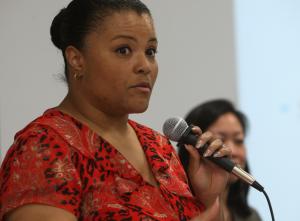 Caption: Alumna Donna J. Nicol encourages her students to seek graduate programs that support their “evolving identities.” Photo by Karen Tapia
Caption: Alumna Donna J. Nicol encourages her students to seek graduate programs that support their “evolving identities.” Photo by Karen Tapia
Alumna Donna J. Nicol (B.A., history ’95), assistant professor of women's studies, said she encourages her students to seek graduate programs that support their “evolving professional and personal identities,” and find out how the programs support diversity.
Civic Engagement
Raphael J. Sonenshein, professor of political science and chair of the Division of Politics, Administration and Justice, asked if local democracy can be diverse.
He discussed the small city of Bell, where the former city manager, Robert Rizzo, and other top administrators and elected officials allegedly bilked its residents of millions of dollars while paying themselves some of the highest salaries in the nation.
“I am not one of those people who says all local government is Bell,” he said. “Most local governments are run honestly and efficiently.
“But, what’s most significant is where Robert Rizzo carried out his crime. The city of Bell,” Sonenshein added. “If ever there was a place where local democracy needs to work for a diverse community, it is a city like Bell, with a population of only 36,000 people, 90 percent of whom are Latino, more than half foreign born.”
Instead, Bell's working-class residents were taken advantage of by a “vicious extortion scheme,” Sonenshein said. “What we really need to do is to make access more diverse and more accessible and simpler. We should put all local elections on the same day, even in an odd numbered year, and make it California Local Government Day. Make a big deal about it, get everyone excited about it and say that whether you are rich or poor, or white, Latino, Asian, African American, or young or old, today’s your day for local government."
For alumna Sharon Quirk-Silva, a Fullerton City Councilwoman, the lone female and lone Latina on the council, local government works better for all when diverse views are voiced in public forums.
“Even if you are one vote on the council and never in the majority,” she said, “your vote changes the conversation in a way that people have to interact with you in public. On any vote, those people have to think about their decisions and give reasons for them.”
People of diverse backgrounds can make an “enormous impact,” Quirk-Silva said, adding that since before she was elected to the city council, she has made a point of visiting Fullerton's businesses and scores of neighborhoods to find out what issues concern them. She also encourages residents to run for elected office or apply to sit on a board of a local committee or commission, where they can learn about city issues and affect positive change.
Making a Difference
Tu-Uyen N. Nguyen, assistant professor of Asian American studies, recently conducted a year-long service-learning course that produced surveys and delivered results in the form of health education campaigns.
She said her students, through their campaigns, raised awareness of sexual and reproductive health issues in the Asian American and Pacific Islander communities in Orange County. Though the class ended, students have “branched off to other social campaign projects and studies to help other communities,” Nguyen said, adding that they also made presentations at sexual reproductive conferences, and composed a manuscript to “fill in the gaps of the research.”
The manuscript was submitted and recently accepted by a peer-reviewed journal for publication.
Timothy Pham, a student in CSUF's Ed.D. program, even wrote a rap song to help raise awareness as part of the campaign. Hear the song and read the lyrics online.
Nguyen's students called the class “eye-opening,” and said it prompted them to pursue graduate studies and social justice work. She said one student is applying to study social work, another is joining the Peace Corps, another is applying to study pharmacology and another is pursuing a master's degree in public health.
“It's been really inspiring to see where these students are going and what they've initiated and accomplished,” Nguyen said.
Alexandro J. Gradilla, assistant professor and chair of Chicana and Chicano studies, said students often need support through faculty mentorship. Such mentorship can lead a student to pursue graduate studies.
“Diversity is both easy and difficult to do,” he said, adding that even in tough economic times, professors must train their students to be part of a diverse workforce.
“Diversity is not just students informing and enlightening white faculty and white adminstrators,” Gradilla said. “It needs to be seen as an explosion, going everywhere and benefiting everybody.
“Diversity is not learning about minority communities,” he added. “Diversity is about the human condition and devleoping human competency, dealing with the 21st century student that we have here at Cal State Fullerton. We need well-trained professionals, regardless of color, and we need to have deep and meaninglful diversity in order to serve future challenges, future communities, future populations and future issues that we have yet to witness.”
Student Response
Muniba Siddiqui, an international graduate student from Pakistan who attended most of the forum's panel discussions, said she found them to be “enlightening and significant.”
The conference offered a compelling exploration of the role of diversity in today’s “extremely diverse world,” the political science major said. “I was most impressed by the importance the presenters stressed in viewing diversity as an inclusive concept that needs to exist within education as a discipline. Through personal examples that shaped their lives, the presenters made me realize the impact an appreciation of diversity can have in broadening perspectives between people of many backgrounds who need to co-exist."
“Dr. Nicol and Dr. Yee conveyed the importance of embracing social issues that influence lives and actively involve people to become a part of society,” Siddiqui added. “Diversity ties into my field of interest and the conference suggested several ideas for a possible thesis topic. I feel privileged and lucky to have attended the Graduate Diversity Forum and to have participated in such a sustained exploration of the subject.”
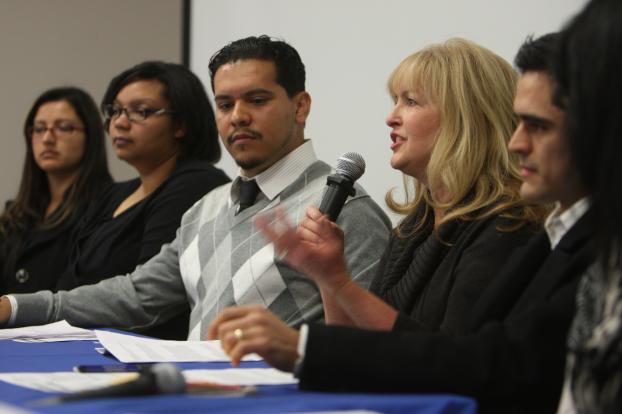 Caption: From left are graduate students Michelle Cuellar Gonzalez, Mariea Daniell Whittington,
Santiago Garcia, Julie Wells and Juan Valdez. Photo by Karen Tapia
Caption: From left are graduate students Michelle Cuellar Gonzalez, Mariea Daniell Whittington,
Santiago Garcia, Julie Wells and Juan Valdez. Photo by Karen Tapia
April 6, 2011
